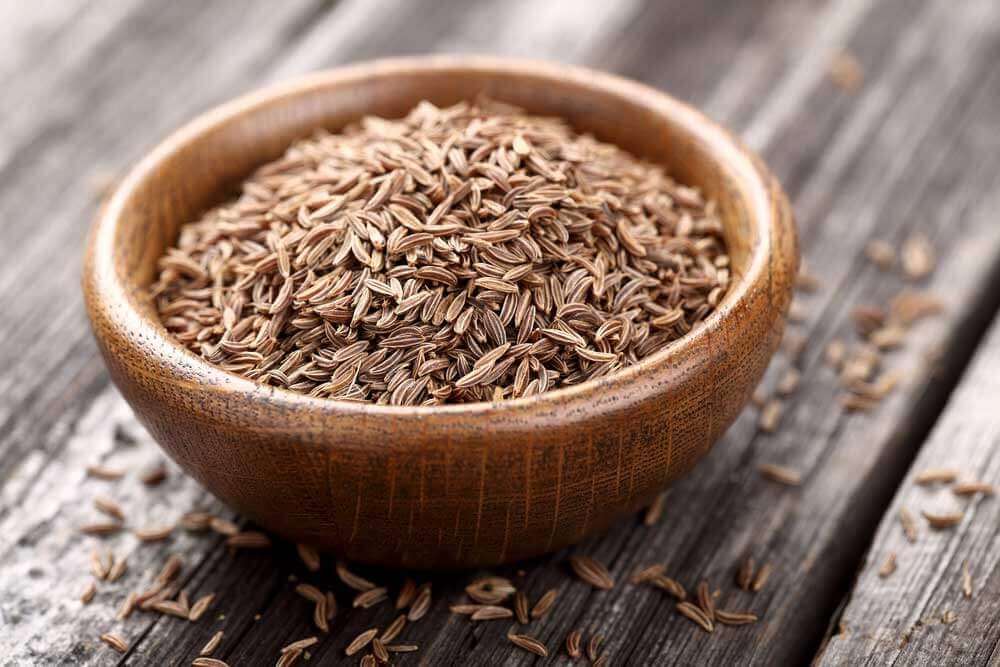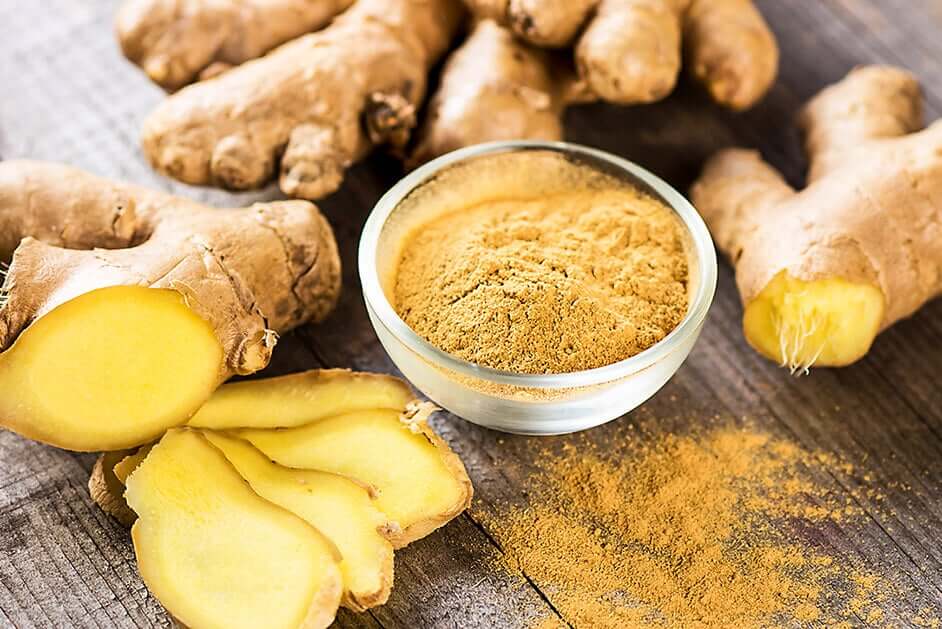4 Natural Remedies to Treat Flatulence

If you’re looking for a natural remedy to treat flatulence, in this article, you’ll find some medicinal plants that could provide relief. These include cumin, fennel, cinnamon, and ginger. Overall, the properties they have that reduce gas and improve digestion.
Then, we’ll also take a look at some helpful preventative advice.
Natural remedies to treat flatulence
Natural medicine has various remedies to treat flatulence. All of them are prepared with spices, herbs, and other elements that have carminative properties that assist with healthy digestion.
But do these benefits have scientific backing?
Let’s take a look.
1. Cumin to treat flatulence

Adding a little cumin (Cuminum cyminum) to meals can indeed be useful to combat flatulence, according to the Iranian Red Crescent Medical Journal. More specifically, it can help with digesting foods that cause bloating – like vegetables, for example.
Cumin can also aid in reducing abdominal pain that causes flatulence. Additionally, it contains a substance that’s good for the gastrointestinal function called cuminic aldehyde.
2. Fennel
The second most utilized natural remedy to treat flatulence is fennel. In fact, various studies like this one from BioMed Research International, report that its seeds, roots, and leaves facilitate the expulsion of gases from the digestive tract.
Fennel is a medicinal plant and a very common digestive remedy. It’s especially effective when suffering from abdominal swelling after eating. It’s also believed to be a good intestinal regulator that reduces constipation as well as diarrhea.
The general recommendation is to drink a fennel infusion and also have it raw in salads, smoothies, juices, and stews. Of course, it’s possible to take it in capsules, and may be beneficial to massage its essential oils into the abdomen.
Further reading – Get to know the properties of fennel
3. Cinnamon to treat flatulence
Cinnamon is a very popular spice used in Ayurvedic Medicine. Some studies have shown that it has anti-inflammatory, antioxidant, and antiseptic properties. However, it’s worth noting the data isn’t corroborated 100% in research with humans.
It’s supposed that these properties can help with digestion and treat flatulence naturally. Also, habitual use is recommended for cases of indigestion, intestinal parasites, and also to improve liver function.
4. Ginger

Lastly, ginger is considered in alternative medicine as a natural remedy for the digestive system. This rhizome stands out because of its gingerol component that can increase gastrointestinal activity and have carminative qualities.
You can take ginger fresh, in powder, in tea, or add it to all types of stews, soups, smoothies, and juices as well as fish since it has the capacity to bring out the flavor in food and make it juicier.
Read also: The Properties and Uses of Ginger
Advice to treat flatulence
In this section, you’ll find some advice that, together with the aforementioned medicinal remedies, will help you to prevent flatulence, to begin with. Of course, if you suffer from flatulence often, consult your doctor for a diagnosis and further suitable treatments.
- One of the causes of flatulence is bad eating habits. Good habits would be to chew your food well, without rushing, in a peaceful environment, and without stress.
- Avoid conversations and arguments whilst eating. If it’s necessary to talk about something, ideally pause eating (to avoid swallowing too much air).
- After finishing your meal, rest for 10-15 minutes. Ideally, do so in a seated position – never lying down.
- People who tend to suffer from gas should opt for simple foods they can digest easily, without combining too many different types at the same time. For example, avoid mixing too many cruciferous foods like broccoli and cauliflower with those high in lactose that tend to cause gas.
- Eating more than necessary can cause flatulence in the digestive tract and overload the stomach. A better practice is to eat smaller meals, more often.
- Try not to drink too much water at mealtimes. Only have a few sips whilst eating. It’s healthier to drink throughout the day, not during mealtime.
- It’s recommended not to have meals or eat when you’re not hungry.
- Where possible, stay away from foods that you know cause flatulence. And, if you suspect you may suffer from some kind of intolerance, see your doctor for analysis.
Is it possible to treat flatulence naturally?
Yes! The natural remedies cited in this article can contribute to the alleviation of flatulence. Also, it may be necessary to make some changes in your diet as well as tweaking your mealtime routine to avoid disturbances whilst eating.
Finally, it’s important to note that some spices – like cinamon and ginger – may be contraindicated. For that reason, it’s of paramount importance to be well informed and check with your doctor before consumption.
All cited sources were thoroughly reviewed by our team to ensure their quality, reliability, currency, and validity. The bibliography of this article was considered reliable and of academic or scientific accuracy.
- Hammouda, F. M., Saleh, M. A., Abdel-Azim, N. S., Shams, K. A., Ismail, S. I., Shahat, A. A., & Saleh, I. A. (2014). Evaluation of the essential oil of Foeniculum vulgare Mill (fennel) fruits extracted by three different extraction methods by GC/MS. https://www.ncbi.nlm.nih.gov/pmc/articles/PMC4202632/
- Larijani, B., Esfahani, M. M., Moghimi, M., Shams Ardakani, M. R., Keshavarz, M., Kordafshari, G., … Zargaran, A. (2016). Prevention and Treatment of Flatulence From a Traditional Persian Medicine Perspective. Iranian Red Crescent Medical Journal. https://doi.org/10.5812/ircmj.23664
- Rehman, R., Akram, M., Akhtar, N., Jabeen, Q., Saeed, T., Shah, S. M. A., … Asif, H. M. (2011). Zingiber officinale Roscoe (Pharmacological Activity). Journal of Medicinal Plants Research.
- Iran Red Crescent Med J. 2016 Apr; 18(4): e23664. Published online 2016 Jan 31. Prevention and Treatment of Flatulence From a Traditional Persian Medicine Perspective. doi: 10.5812/ircmj.23664
- Biomed Res Int. 2014; 2014: 842674. Published online 2014 Aug 3. Foeniculum vulgare Mill: A Review of Its Botany, Phytochemistry, Pharmacology, Contemporary Application, and Toxicology. doi: 10.1155/2014/842674
- Gruenwald, Joerg & Freder, Janine & Armbruester, Nicole. (2010). Cinnamon and Health. Critical reviews in food science and nutrition. 50. 822-34. 10.1080/10408390902773052.
- Indian J Exp Biol. 1999 Mar;37(3):238-42. Anti-oxidant effects of cinnamon (Cinnamomum verum) bark and greater cardamom (Amomum subulatum) seeds in rats fed high fat diet . https://pubmed.ncbi.nlm.nih.gov/10641152/
- Food Funct. 2015 Mar;6(3):910-9. Anti-inflammatory activity of cinnamon (C. zeylanicum and C. cassia) extracts – identification of E-cinnamaldehyde and o-methoxy cinnamaldehyde as the most potent bioactive compounds. doi: 10.1039/c4fo00680a.
- Singletary, Keith. (2010). Ginger: An Overview of Health Benefits. Nutrition Today. 45. 171-183. 10.1097/NT.0b013e3181ed3543.
This text is provided for informational purposes only and does not replace consultation with a professional. If in doubt, consult your specialist.








